
We look at the targeting of journalists in Gaza with journalist Shrouq Aila, who joins us from Deir al-Balah in central Gaza. Aila’s husband Roshdi Sarraj, a fellow journalist and co-founder of the production company Ain Media, was killed in an Israeli airstrike on their home in October. Aila recounts how Sarraj’s shielding of her and her 1-year-old daughter saved their lives. “Everything went into dust, in just a second,” she says. As she mourned, Aila continued her work as a journalist and took over Sarraj’s place at Ain Media, saying her commitment as a journalist means a “duty of documenting the reality of the ground,” no matter what.
Transcript
AMY GOODMAN: This is Democracy Now!, democracynow.org, The War and Peace Report. I’m Amy Goodman, with Nermeen Shaikh.
In a moment, we’re going to Bolivia, where an attempted coup has just been subverted. But we are attempting to stay in Gaza for a minute to speak with our guest on the ground, Shrouq Aila, who is an independent journalist and producer. Her husband, the journalist Roshdi Sarraj, was killed in an Israeli airstrike in October. He ran Ain Media, which Aila now heads.
Aila, if you can talk about what happened to your husband and what Ain Media is, the organization you now head, and how you try to cover Gaza every day from the ground? We’re speaking to you in Deir al-Balah, Gaza, in front of a hospital. If you could —
SHROUQ AILA: Yeah, I hear you now.
AMY GOODMAN: Shrouq, tell us what happened to your husband. And what is Ain Media, that he’s headed and now you head?
SHROUQ AILA: All right. Like, when this genocide started, it was on the 7th of October. At that timing, we were traveling abroad, Roshdi and I and our daughter Dania. She was, at the timing, 10 months old. And we were traveling for a work trip outside of Palestine. And then, when this genocide hit the Gaza Strip, we decided to immediately cancel everything and, like, swiftly return to Gaza Strip, because when it comes to wars and you are just outside, you die several times of not being with your families and also not joining and doing the duty of documenting the reality on the ground.
So, we arrived the Gaza Strip in the second day of this genocide. And we immediately moved to the family house of Roshdi, because our house is on the seventh floor, and when it comes to bombings, it’s better to be in lower floors, because of the shrapnels and also because of the nonstopping shakings of houses because of the heavy rockets. So, we decided just to move to his family house, and Roshdi decided to go and document alone.
Why he decided to go to document alone? Because in the first day, on the 7th of October, the Israeli army launched several rockets on the north of the Gaza Strip, and it actually hit our team. One got killed. Two are missing so far. We are not even able to know whether they are under the rubbles or they are kidnapped in the Israeli jails, and hopefully it’s the second option. Like, we believe it’s never alive in being in a prison, but at least, like, having them alive is such a sign. So, Roshdi, after losing one of our dear members, Ibrahim Lafi, and losing two members, Haitham Abdelwahed and Nidal al-Waheidi, from the Ain Media team members, so he decided to go and film alone. And I decided to stay at home with our little baby. And to be frank in this, that I never decided to stop him doing this documenting, because it’s such a duty when you decide to be a journalist. So, it’s a journalist for life. It’s a sentence for life.
And then, after being able to do the document like every day, like, on Sunday, the 22nd of October, 2023, like, let me say, directly after two weeks of the beginning of this genocide, Roshdi was preparing himself to go to do the documenting inside the ambulance. And I was, at that timing, hesitating about him leaving to go to do the documentation inside the ambulance, because since this war started, lots of ambulances got attacked and lots of medics got killed, because of the severe attack against the health workers. So, like, I was convincing him to try to not be in the ambulance and just stay at the hospital, like, watching over the ambulance movements and so. But, unfortunately, like, we had that discussion, and then he decided just to go. I said, “No, first you have to ask your family about going in an ambulance.” And then, after we finally decided, like, it’s totally fine to go to do his duty, to do the documentation inside the ambulances and how the health workers are really doing hard work in terms of rushing and going through risky areas to rescue the casualties, so we decided just he can just go.
But Roshdi decided that he will never leave the house before we had breakfast together. So he gathered all of his family members, and he insisted, at that time, to have the breakfast together. And, like, his mom told him, like, “You can just leave. Have your breakfast and just leave. You are quite busy. Nobody is ready for the breakfast.” But he really insisted to have the breakfast. Maybe he has that sense that it is the last breakfast, and he wanted to leave us a memory in this.
So, once we started to have the breakfast at 11 a.m., we heard a very massive explosion, like so close to the house. This explosion actually made the table to move. So we immediately rushed to the ground floor, because there is that believing that when it comes to too close bombings, you better just to go for the ground floor or to the stairs. I know it’s not a safe area. But, you know, that sense of you are not controlling your fear, because you’re just hearing nonstopping bombings nearby. So we rushed to the ground floor, and we stood together. We were nine members at that time. And I was holding Roshdi’s hand, and he was quite close to me. I was holding Dania on the other hand. And she’s a baby. She was 11 months old. So, I was holding his hand and just discussing with him of how nearby are those explosions, because we are feeling that things are, like, falling, and there are — like, glasses are getting broken. Like, I was super afraid, all of us.
So, in a blink, like before the explosion, in two minutes — in two seconds, Roshdi just moved from being my side, and he stood in front of me. So, basically, he gave me a shield. And after two seconds, I was just trying to let him get it back, where he used to stand, and everything went into dust. Like, in just a second, everything went into dust. At that moment, I thought that I got a low sugar pressure, because, you know, when it comes of bombing, of when you are attacked, you will never hear the explosion, because of the air pressure. So, the first thing that I — I wasn’t able to see anything. It was just dust. Then I started to smell the gunpowder, the concrete, the burned concrete, and the dust. So I tried just to wave my hand, searching for my husband, for my Roshdi. And I wasn’t able to find him.
Like one minute later, I felt there is something very heavy on my legs. So I tried to search: What is that? Because I cannot just move my legs for this. And then, unfortunately, it was Roshdi. And he got hit in his head. But it was one centimeter, a crack in his head, but I could see at that moment the brain from inside. So, I tried to hold on my breath. I called the ambulances. And they said, “We apologize for not coming to the area, because the area is being under heavy attack, and it’s not stopping since 20 minutes.” So I called my brother. He’s a doctor. I described to him the injury of Roshdi. And he told me that you cannot just do — “You cannot do anything for him. Try to walk and go to the hospital.”
So, we carried Roshdi, and we walked to the hospital. It took us almost 15 minutes until we arrived Al-Quds Hospital in the Tel al-Hawa neighborhood. But he didn’t make it. Like, he immediately left us. Left us. But he didn’t just leave us. He also left a reality of that Israel has been deliberately targeting the journalists in the Gaza Strip.
AMY GOODMAN: Shrouq Aila, we want to thank you so much for being with us. I’m so sorry you had to share that painful story. Our deepest condolences on the death of your husband. Shrouq is an independent journalist who has taken over Ain Media, which her husband headed, the journalist Roshdi Sarraj, killed in an Israeli airstrike in October. We thank you so much for being with us from Deir al-Balah in front of Al-Aqsa Hospital.
We’re going to end today just by talking for a moment about what happened in Bolivia, where thousands filled the streets of the capital La Paz to confront military forces who tried to carry out a coup against the democratically elected President Luis Arce. Hours after the coup failed, Bolivian authorities arrested the rogue military commander, General Juan José Zúñiga, and his alleged co-conspirator, Navy chief Juan Arnez. The president, Arce, has sworn in new heads of the Army, Navy and Air Force. We will speak online with our guest, who’s in Cochabamba, Bolivia, Kathryn Ledebur, who is director of the Andean Information Network. You can go to democracynow.org for that report.
But we have to end now. We wish a very happy birthday to Jon Randolph and let you know about a job opening at Democracy Now! We are currently accepting applications for a director of development. Learn more and apply at democracynow.org.
Democracy Now! is produced with Mike Burke, Renée Feltz, Deena Guzder, Sharif Abdel Kouddous, Messiah Rhodes, María Taracena, Tami Woronoff, Charina Nadura, Sam Alcoff, Tey-Marie Astudillo, John Hamilton, Robby Karran, Hany Massoud and Hana Elias. Our executive director is Julie Crosby. Special thanks to Becca Staley, Jon Randolph, Paul Powell, Mike Di Filippo, Miguel Nogueira, Hugh Gran, Denis Moynihan, David Prude, Dennis McCormick, Matt Ealy, Anna Özbek, Emily Andersen and Buffy Saint Marie Hernandez. Tune in to our specials next week on July 4th and 5th. And you can watch any broadcast and any podcast wherever you get your podcasts. I’m Amy Goodman, with Nermeen Shaikh. Thanks so much for joining us.

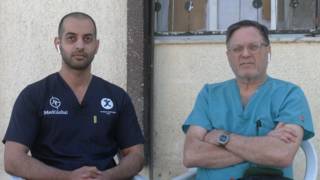
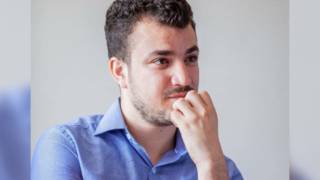
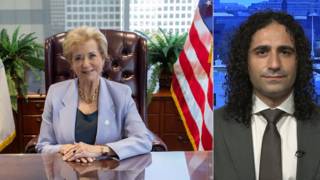
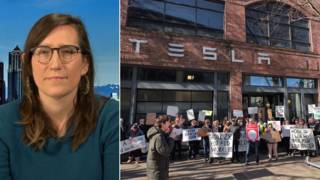





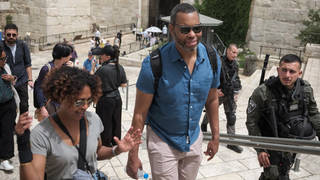
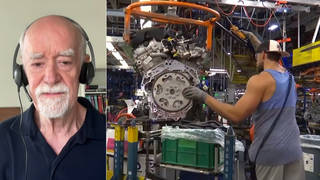
Media Options